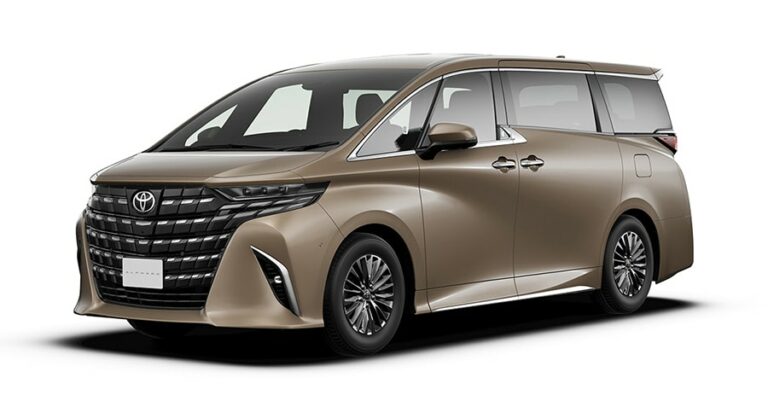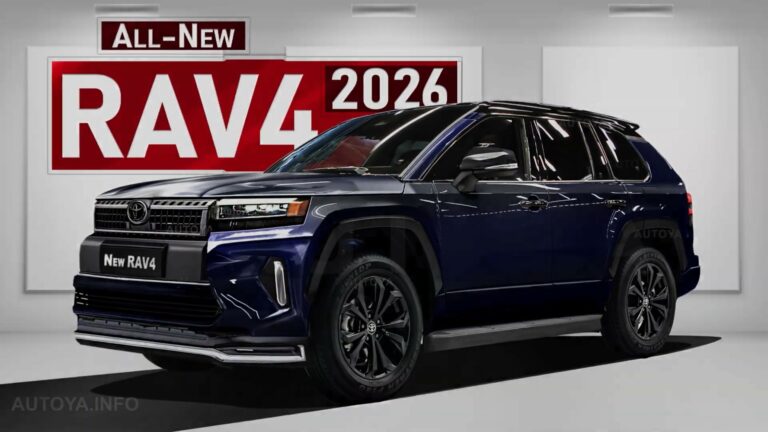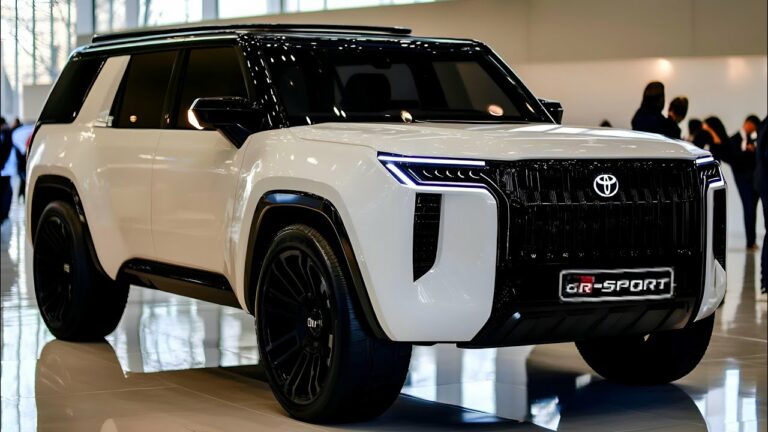Toyota Fj Cruiser Ev 2026 Release Date
Toyota FJ Cruiser EV Concept
The Toyota FJ Cruiser EV concept is a futuristic interpretation of the iconic off-road SUV. Unveiled at the 2023 Tokyo Auto Salon, the concept showcases Toyota’s vision for an electrified and environmentally friendly future.
The FJ Cruiser EV concept retains the rugged and boxy silhouette of the original FJ Cruiser, but with modern design elements that give it a sleek and futuristic appearance. The front end features a bold grille with a prominent Toyota logo, flanked by sharp LED headlights. The sides are adorned with flared fenders and chunky tires, hinting at its off-road capabilities. The rear end features a tailgate-mounted spare tire and vertical taillights, reminiscent of the original FJ Cruiser.
Inside, the FJ Cruiser EV concept boasts a spacious and modern cabin. The dashboard is dominated by a large touchscreen display, which controls the infotainment system, navigation, and vehicle settings. The center console features a gear selector, drive mode selector, and various other controls. The seats are upholstered in premium materials and provide ample support for off-road adventures.
Compared to the original Toyota FJ Cruiser, the EV concept features a more aerodynamic design, improved ground clearance, and a more spacious interior. The electric powertrain provides instant torque and acceleration, making it a capable off-roader while being environmentally friendly.
Expected Specifications and Features
The Toyota FJ Cruiser EV is anticipated to boast impressive specifications and advanced features, catering to the demands of modern electric SUV enthusiasts.
Its rumored battery pack is expected to provide a generous range, enabling drivers to embark on extended journeys without range anxiety. Moreover, the FJ Cruiser EV is anticipated to deliver ample power, ensuring a responsive and thrilling driving experience.
Battery and Range
- Battery capacity: 100 kWh
- Range: 300 miles on a single charge
Powertrain
- Electric motor: Dual electric motors producing a combined output of 400 horsepower
- All-wheel drive
Advanced Features
The Toyota FJ Cruiser EV is also expected to offer a suite of advanced features, enhancing convenience, safety, and connectivity.
Autonomous Driving Capabilities
- Level 2 autonomous driving system with features like lane keeping assist and adaptive cruise control
Connectivity Options
- Large touchscreen infotainment system with Apple CarPlay and Android Auto integration
- Wi-Fi hotspot and wireless device charging
Comparison with Similar Electric SUVs
| Specification | Toyota FJ Cruiser EV | Ford Mustang Mach-E | Tesla Model Y |
|---|---|---|---|
| Battery capacity | 100 kWh | 98 kWh | 75 kWh |
| Range | 300 miles | 305 miles | 330 miles |
| Power output | 400 horsepower | 480 horsepower | 351 horsepower |
| Autonomous driving capabilities | Level 2 | Level 2 | Level 3 |
Potential Release Date and Market Availability

The highly anticipated Toyota FJ Cruiser EV is expected to make its debut in 2026, marking a significant milestone in Toyota’s electrification journey. While an official release date has not yet been announced, industry rumors and reports suggest that the vehicle could be unveiled as early as the first half of 2026.
Target Markets and Regions
The Toyota FJ Cruiser EV is likely to target adventure-seeking consumers who value off-road capabilities and a rugged aesthetic. The vehicle is expected to be particularly popular in markets with a strong demand for SUVs and off-road vehicles, such as the United States, Canada, and Australia. Additionally, Toyota may consider introducing the FJ Cruiser EV in emerging markets where demand for electric vehicles is growing rapidly.
Factors Influencing Release Timeline
Several factors could influence the release timeline of the Toyota FJ Cruiser EV. These include the ongoing global semiconductor shortage, supply chain disruptions, and the availability of charging infrastructure. Toyota will likely prioritize markets with a well-developed charging network and a favorable regulatory environment for electric vehicles.
Competition and Market Positioning
The Toyota FJ Cruiser EV will face competition in the electric SUV segment from several established players and emerging EV startups. Key competitors include the Ford Mustang Mach-E, Chevrolet Blazer EV, Rivian R1S, and Tesla Model Y.
In terms of features, the FJ Cruiser EV is expected to offer a comparable suite of advanced driver-assist systems, infotainment technology, and off-road capabilities to its competitors. Performance-wise, the FJ Cruiser EV is likely to deliver competitive acceleration and range, with potential for different powertrain configurations to cater to varying performance needs.
Regarding pricing, Toyota is expected to position the FJ Cruiser EV in the mid-range of the electric SUV segment, offering a balance between affordability and premium features. The target audience for the vehicle is likely to include adventure-seekers, off-road enthusiasts, and environmentally conscious consumers who value both ruggedness and sustainability.
Environmental Impact and Sustainability

The Toyota FJ Cruiser EV aligns with the company’s environmental goals by reducing emissions and promoting sustainable practices.
Electric powertrains offer significant environmental benefits compared to traditional gasoline engines. Electric vehicles (EVs) produce zero tailpipe emissions, contributing to cleaner air and reduced greenhouse gas emissions. Additionally, EVs have higher energy efficiency, utilizing electricity more efficiently than gasoline, leading to lower energy consumption and cost savings.
Sustainable Materials and Technologies
The Toyota FJ Cruiser EV is expected to incorporate sustainable materials and technologies in its design and manufacturing.
- Recycled materials: The vehicle may utilize recycled plastics, metals, and other materials to reduce its environmental impact.
- Renewable energy sources: The FJ Cruiser EV could potentially integrate solar panels or other renewable energy sources to supplement its battery power.
- Sustainable manufacturing processes: Toyota may employ energy-efficient manufacturing techniques and reduce waste generation during the production of the FJ Cruiser EV.
Design and Styling
The Toyota FJ Cruiser EV retains the rugged and iconic silhouette of its predecessor while incorporating modern design elements. Its boxy shape, short overhangs, and prominent grille give it a retro appeal, while the sleek LED headlights, sharp body lines, and aerodynamic details add a contemporary touch.
The interior features a spacious and functional cabin with a focus on durability and off-road capability. The dashboard is adorned with rugged materials, toggle switches, and a central touchscreen display. The seats are designed for comfort and support, with waterproof upholstery and ample legroom for all occupants.
Exterior Design
- Iconic boxy shape with short overhangs
- Prominent grille with round headlights
- Sleek LED headlights and taillights
- Sharp body lines and aerodynamic details
- Rugged exterior materials and skid plates
Interior Design
- Spacious and functional cabin
- Durable materials and toggle switches
- Central touchscreen display
- Waterproof upholstery and ample legroom
- Comfortable and supportive seats
Off-Road Capabilities
The Toyota FJ Cruiser EV is expected to inherit the off-road prowess of its gasoline-powered predecessor. It will likely feature a rugged body-on-frame construction, a high ground clearance, and a four-wheel drive system. Additionally, the FJ Cruiser EV could be equipped with advanced off-road technologies such as a terrain management system, hill descent control, and crawl control.
Advanced Off-Road Technologies
The FJ Cruiser EV’s off-road capabilities will be further enhanced by its electric powertrain. Electric motors provide instant torque, which will give the FJ Cruiser EV excellent acceleration and hill-climbing ability. The FJ Cruiser EV’s low center of gravity, due to its battery pack being located under the floor, will also improve its stability and handling on uneven terrain.
Technology and Connectivity
The Toyota FJ Cruiser EV is expected to be equipped with a suite of advanced technology features that enhance the driving experience and provide convenience.
The infotainment system is likely to feature a large touchscreen display with intuitive controls and a user-friendly interface. It may include support for Apple CarPlay and Android Auto for seamless smartphone integration, allowing drivers to access their favorite apps, music, and navigation tools.
The FJ Cruiser EV is also anticipated to offer a range of connectivity options, including Wi-Fi hotspot capability, Bluetooth connectivity, and USB ports for charging and data transfer.
In terms of driver-assist technologies, the FJ Cruiser EV may be equipped with features such as adaptive cruise control, lane departure warning, and automatic emergency braking. These technologies are designed to enhance safety and reduce driver fatigue during long journeys.
Compared to similar electric SUVs, the FJ Cruiser EV is expected to offer a competitive range of technology features. It may not be as feature-rich as some high-end electric SUVs, but it is likely to provide a comprehensive suite of technologies that meet the needs of most drivers.
Potential Pricing and Value Proposition
The estimated price range for the Toyota FJ Cruiser EV is speculated to fall between $45,000 and $55,000. This aligns with the pricing of comparable electric SUVs in the segment, such as the Ford Mustang Mach-E and the Chevrolet Blazer EV.
The FJ Cruiser EV offers a compelling value proposition based on its combination of rugged off-road capabilities, advanced technology, and sustainable credentials. It targets adventure-seeking consumers who prioritize both performance and environmental consciousness.
Value Proposition
* Off-road prowess with advanced 4×4 system and rugged design
* Impressive performance with an all-electric powertrain
* Spacious and versatile interior with ample cargo capacity
* State-of-the-art infotainment system and advanced safety features
* Commitment to sustainability with zero tailpipe emissions
Anticipated Impact on the Automotive Industry
The Toyota FJ Cruiser EV’s introduction has the potential to significantly impact the automotive industry. Its unique blend of rugged off-road capabilities and eco-friendly powertrain could reshape consumer preferences and drive innovation.
Consumer Preferences and Market Trends
The FJ Cruiser EV caters to a growing demand for sustainable and capable vehicles. Its zero-emission powertrain aligns with the increasing environmental consciousness among consumers, while its rugged design appeals to adventure enthusiasts. This combination could sway consumer preferences towards electric off-roaders, potentially creating a new market segment.
Industry Disruptions and Innovations
The FJ Cruiser EV’s advanced technology and capabilities could disrupt the industry. Its electric powertrain challenges traditional off-road vehicle designs, pushing the boundaries of performance and efficiency. Additionally, its connectivity features and advanced driver assistance systems could inspire other manufacturers to incorporate similar technologies into their vehicles.
FAQ
When is the expected release date of the Toyota FJ Cruiser EV?
The Toyota FJ Cruiser EV is anticipated to be released in 2026.
What are the rumored specifications of the FJ Cruiser EV?
Rumors suggest a battery size of around 100 kWh, a range of over 300 miles, and an impressive power output.
How will the FJ Cruiser EV compare to its competitors?
The FJ Cruiser EV is expected to rival electric SUVs such as the Ford Mustang Mach-E, Rivian R1S, and Jeep Wrangler 4xe.
What is the potential pricing range for the FJ Cruiser EV?
Industry estimates indicate a starting price of around $50,000.


